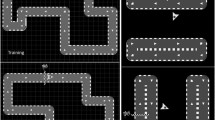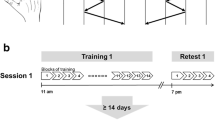Abstract
Many motor rehabilitation therapies are based on principles of motor learning. Motor learning depends on preliminary knowledge of the trained and other (similar) skills. This study sought to investigate the influence of prior skill knowledge on re-learning of a precision reaching skill after a cortical lesion in rat. One group of animals recovered a previously known skill (skill training, followed by stroke and re-learning training, TST, n = 8). A second group learned the skill for the first time after stroke (ST, n = 6). A control group received prolonged training without stroke (n = 6). Unilateral partial motor cortex lesions were induced photothrombotically after identifying the forelimb representation using epidural stimulation mapping. In TST animals, re-learning after stroke was slower than learning before stroke (post hoc repeated measures ANOVA P = 0.039) and learning in the control group (P = 0.033). De novo learning after stroke (ST group) was not different from healthy learning. These findings show that skill learning can be performed if the motor cortex is partially lesioned; re-learning of a skill after stroke is slowed by prior knowledge of the skill. It remains to be tested in humans whether task novelty positively influences rehabilitation therapy.





Similar content being viewed by others
References
Biernaskie J, Szymanska A, Windle V, Corbett D (2005) Bi-hemispheric contribution to functional motor recovery of the affected forelimb following focal ischemic brain injury in rats. Eur J Neurosci 21:989–999
Buitrago MM, Ringer T, Schulz JB, Dichgans J, Luft AR (2004) Characterization of motor skill and instrumental learning time scales in a skilled reaching task in rat. Behav Brain Res 155:249–256
Carr J, Shepherd R (1987) A motor relearning programme for stroke. Butterworth Heinemann, Oxford
Gharbawie OA, Auer RN, Whishaw IQ (2006) Subcortical middle cerebral artery ischemia abolishes the digit flexion and closing used for grasping in rat skilled reaching. Neuroscience 137:1107–1118
Iriki A, Pavlides C, Keller A, Asanuma H (1989) Long-term potentiation in the motor cortex. Science 245:1385–1387
Kleim JA, Bruneau R, VandenBerg P, MacDonald E, Mulrooney R, Pocock D (2003) Motor cortex stimulation enhances motor recovery and reduces peri-infarct dysfunction following ischemic insult. Neurol Res 25:789–793
Lindner MD, Gribkoff VK, Donlan NA, Jones TA (2003) Long-lasting functional disabilities in middle-aged rats with small cerebral infarcts. J Neurosci 23:10913–10922
Luft AR, Buitrago MM, Ringer T, Dichgans J, Schulz JB (2004) Motor skill learning depends on protein synthesis in motor cortex after training. J Neurosci 24:6515–6520
Metz GA, Antonow-Schlorke I, Witte OW (2005) Motor improvements after focal cortical ischemia in adult rats are mediated by compensatory mechanisms. Behav Brain Res 162:71–82
Molina-Luna K, Buitrago MM, Hertler B, Schubring M, Haiss F, Nisch W, Schulz JB, Luft AR (2006) Cortical stimulation mapping using epidurally implanted thin-film microelectrode arrays. J Neurosci Methods. doi:10.1016/j.jneumeth.2006.10.025
Neafsey EJ, Bold EL, Haas G, Hurley-Gius KM, Quirk G, Sievert CF, Terreberry RR (1986) The organization of the rat motor cortex: a microstimulation mapping study. Brain Res 396:77–96
Newell KM, Liu YT, Mayer-Kress G (2001) Time scales in motor learning and development. Psychol Rev 108:57–82
Oermann E, Bidmon HJ, Witte OW, Zilles K (2004) Effects of 1alpha,25 dihydroxyvitamin D3 on the expression of HO-1 and GFAP in glial cells of the photothrombotically lesioned cerebral cortex. J Chem Neuroanat 28:225–238
Ramanathan D, Conner JM, Tuszynski MH (2006) A form of motor cortical plasticity that correlates with recovery of function after brain injury. Proc Natl Acad Sci USA 103:11370–11375
Rioult-Pedotti MS, Friedman D, Donoghue JP (2000) Learning-induced LTP in neocortex. Science 290:533–536
Schroeter M, Kury P, Jander S (2003) Inflammatory gene expression in focal cortical brain ischemia: differences between rats and mice. Brain Res Mol Brain Res 117:1–7
Shadmehr R, Holcomb HH (1997) Neural correlates of motor memory consolidation. Science 277:821–825
Ward NS (2004) Functional reorganization of the cerebral motor system after stroke. Curr Opin Neurol 17:725–730
Watson BD, Dietrich WD, Busto R, Wachtel MS, Ginsberg MD (1985) Induction of reproducible brain infarction by photochemically initiated thrombosis. Ann Neurol 17:497–504
Acknowledgments
This work was supported by a grant from the IZKF of the University of Tübingen (E0500139.2) and the Deutsche Forschungsgemeinschaft (SFB 550, C12). We thank Marion Schiffmann for her diligent help.
Author information
Authors and Affiliations
Corresponding author
Rights and permissions
About this article
Cite this article
Schubring-Giese, M., Molina-Luna, K., Hertler, B. et al. Speed of motor re-learning after experimental stroke depends on prior skill. Exp Brain Res 181, 359–365 (2007). https://doi.org/10.1007/s00221-007-0930-3
Received:
Accepted:
Published:
Issue Date:
DOI: https://doi.org/10.1007/s00221-007-0930-3




